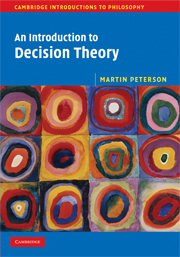Book contents
- Frontmatter
- Contents
- Preface
- 1 Introduction
- 2 The decision matrix
- 3 Decisions under ignorance
- 4 Decisions under risk
- 5 Utility
- 6 The mathematics of probability
- 7 The philosophy of probability
- 8 Why should we accept the preference axioms?
- 9 Causal vs. evidential decision theory
- 10 Bayesian vs. non-Bayesian decision theory
- 11 Game theory I: Basic concepts and zero-sum games
- 12 Game theory II: Nonzero-sum and cooperative games
- 13 Social choice theory
- 14 Overview of descriptive decision theory
- Appendix A Glossary
- Appendix B Proof of the von Neumann–Morgenstern theorem
- Further reading
- Index
1 - Introduction
- Frontmatter
- Contents
- Preface
- 1 Introduction
- 2 The decision matrix
- 3 Decisions under ignorance
- 4 Decisions under risk
- 5 Utility
- 6 The mathematics of probability
- 7 The philosophy of probability
- 8 Why should we accept the preference axioms?
- 9 Causal vs. evidential decision theory
- 10 Bayesian vs. non-Bayesian decision theory
- 11 Game theory I: Basic concepts and zero-sum games
- 12 Game theory II: Nonzero-sum and cooperative games
- 13 Social choice theory
- 14 Overview of descriptive decision theory
- Appendix A Glossary
- Appendix B Proof of the von Neumann–Morgenstern theorem
- Further reading
- Index
Summary
On 6 September 1492 Christopher Columbus set off from the Canary Islands and sailed westward in an attempt to find a new trade route between Europe and the Far East. On 12 October, after five weeks of sailing across the Atlantic, land was sighted. Columbus had never been to the Far East, so when he landed in Middle America (‘the West Indies’) he believed that he had indeed discovered a new route to the Far East. Not until twenty-nine years later did Magellan finally discover the westward route to the Far East by sailing south around South America.
Columbus' decision to sail west from the Canary Islands was arguably one of the bravest decisions ever made by an explorer. But was it rational? Unlike some of his contemporaries, Columbus believed that the Earth is a rather small sphere. Based on his geographical assumptions, he estimated the distance from Europe to East India to total 2,300 miles. The actual distance is about 12,200 miles, which is more than five times farther than Columbus thought. In the fifteenth century no ship would have been able to carry provisions for such a long journey. Had America not existed, or had the Earth been flat, Columbus would certainly have faced a painful death. Was it really worth risking everything for the sake of finding a new trade route?
Information
- Type
- Chapter
- Information
- An Introduction to Decision Theory , pp. 1 - 16Publisher: Cambridge University PressPrint publication year: 2009
